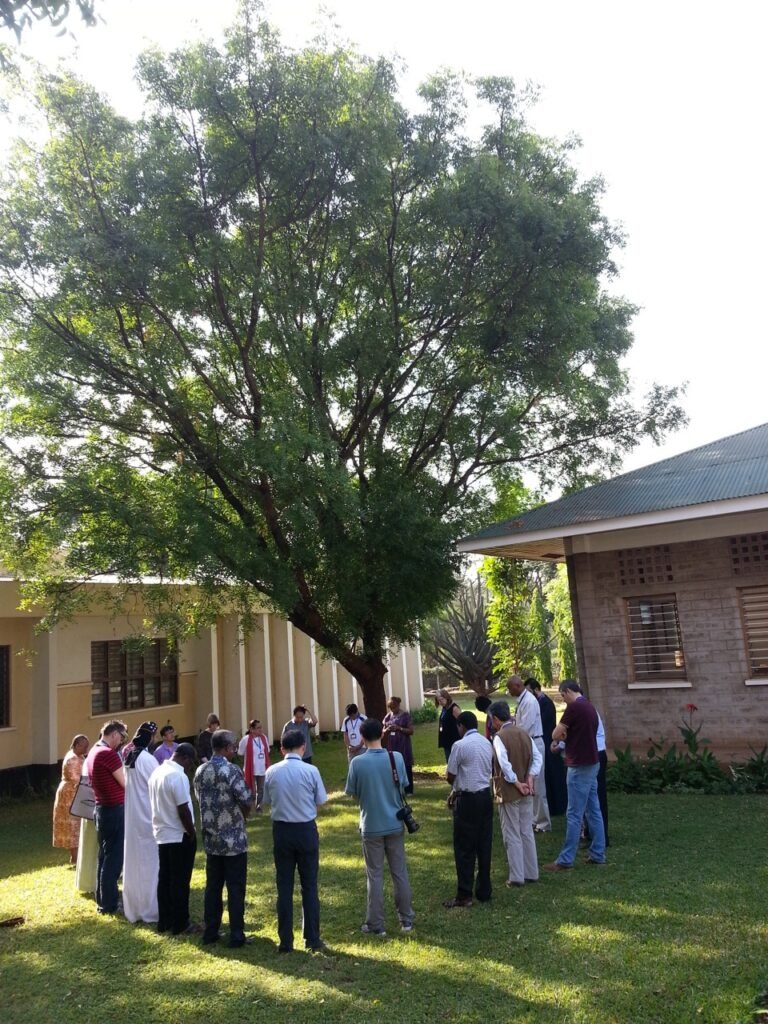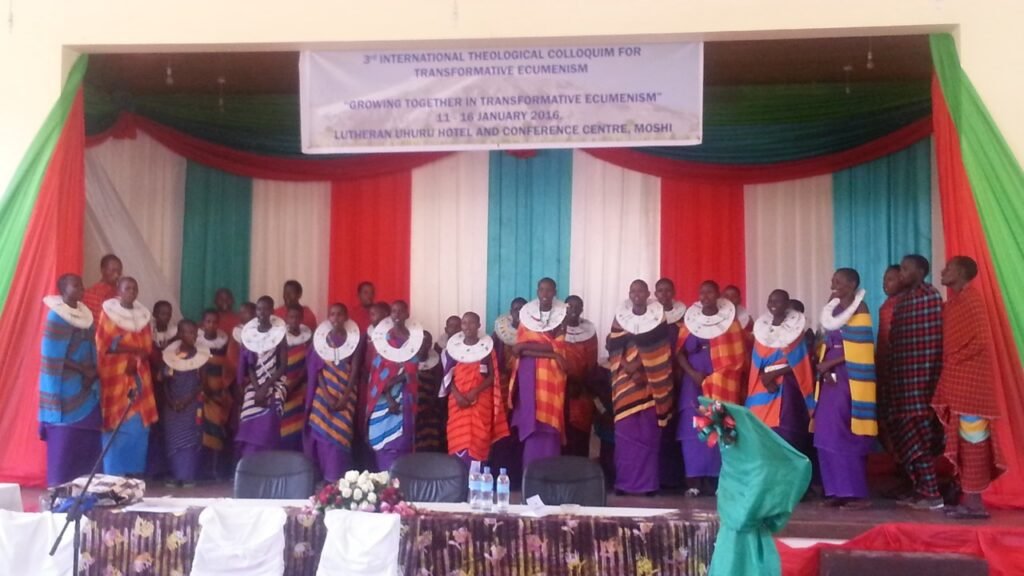“The Spirit of the Lord is upon me because He anointed me to preach the good news to the poor, proclaim release to the captives, and recovery of sight to the blind, to set free those who are oppressed” Luke 4:18.
Inspired by the biblical text above, Transformative Ecumenism attempts to build a justice centred unity movement, making partnership with the mission that those at the margins of our world and church call for and lead. The signs of the times call urgently for a new spirit of ecumenism that extends beyond the church’s boundaries and internal affairs.
Aims of the colloquium were:
- To extend our vision of Transformative Ecumenism into the African context as a further part of the revitalization of the Christian story from the South
- To continue the process of critical engagement with Conciliar Ecumenism
- To discerning strategies and actions by which we can invite the renewal of ecumenical vision and praxis

Contextual Realities
The broad vision of transformative ecumenism is rooted on the quest for a more proactive movement that challenges systems and structures that prey and turn human life and all living beings as commodity. During the colloquium participants listened and engaged with human and environmental challenges common in Africa as a continent, Philippines, Middle East, Africans in Diaspora and other global forces that work against common humanity. Some of the challenges include; abject poverty, HIV/AIDS, forced migration, violent conflicts, proliferation of fire-arms and light weapons, human and drug trafficking, gender disparity and violence, climate change, land grabbing, food insecurity, poaching and destruction of wildlife, racial, casteism, social discrimination, xenophobia and fear of the other, etc. Some of the notable forces that militate against the common good of all are; the current economic system that concentrates bulk of the global capital resources in the hands of few at the expense of the huge majority; the highhandedness of the so-called world powers; heavy weaponisation and militarisation of peace making and maintenance; extreme religious fundamentalism and radicalism; global conspiracy against Palestine-Israel; local and global political and social systems and structures that exclude and inflict sufferings on others. These realities are speedily challenging the idea of the common life of humanity and living beings made by God.
Intersecting Conversations on TE and the Emerging Themes
The colloquium offered participants the opportunity to reflect and digest on issues that are considered critical for the growing of a life centred transformative ecumenism. Some themes emerged during the colloquium that require deeper reflections and application in this renewed ecumenical quest. These were:
- Passionate leadership
Leadership in TE is of essential value. In order to promote, protect and nurture life, transformative leadership needs to be purpose-driven, see it as its main task to serve the life of
community and find a people- and justice-centred answer to the question why a certain person is occupying a certain office. Transformative leadership requires preparation and the readiness to embed leadership in the contextual struggles, visions and challenges of people. Leaders need to be able to read the signs of time. Transformative leadership requires passion for issues of justice and life. Leaders need to be humble and be prepared to be in uncomfortable places and be led by those who are the experts of their own situation. Transformative leadership is based on a servanthood-model and needs strategic positioning in the agendas of communities as well as in advocacy-approaches. Theological education and training centres could be a basis for transformational leadership formation.
- Authentic Solidarity
Transformative ecumenism should compel us to be in active solidarity with those on the margins. Our solidarity actions both at the local and global levels have to be inspired by strong convictions as an authentic participation in the mission of God, with the awareness that issues of justice, human dignity and vitality of life are central to ecumenism that is transformative.
- Deeper ecumenism:
TE invites us to step beyond the classical ecumenical space that is confined to inner-Christian, inter-denominational engagement and unity. It calls for a broader interfaith relation and cooperation for justice and the common good. Therefore, TE is anchored in the notion of our common life and the inherent value of each and every human being and the earth. TE also needs to develop a life-centred eco-ecumenism that honours the connectedness of all the communities of the earth.
- Interconnectedness
The need to build life-affirming networks and interconnectedness at local and global levels that transcend religious and cultural, socio-economic, political and geographical boundaries remains cardinal in the expression transformative ecumenism. Transformative ecumenism facilitates honest, transparent and accountable networks constructed on reliable relations. It is important that more and more churches at the grassroots take it as obligation to step out, connect and network with other churches and other religious groups within their communities in order to response to common issues together. Likewise at national and global levels, life-centred networks and social movements should be initiated with the overarching objective of exposing and confronting unjust systems.
- Celebrating Inclusivity:
TE acknowledges and celebrates life in all its diversity and delights in and acknowledges different and distinctive identities. Inclusive communities are welcoming spaces where people can find spaces of belonging irrespective of, for example, age, gender, sexual identity, ethnicity and culture, nationality, religious background, geographical location and so-called able bodiedness. TE fosters the essential unity of humankind and denounces excluding and denigrating practices that violate the God-given rights of a person.
- Self-Critique and Reflection:
We acknowledge each of us have contributed to the maintenance of the status quo of the conciliar ecumenism. However, persuaded by conviction of repentance, we recognise that Transformative Ecumenism demands us to be in a vocation of transformation. It also requires that we remain authentically prophetic in our ecumenical engagements by refusing to conform to the patterns of the empire and other institutionalised forces.
- Rethinking ecumenism:
TE as a faith-driven movement towards justice and life requires a shift of location in hermeneutical as well as in geographical terms – from the board rooms to the streets and from dogma to life. Life and lives matter, therefore, TE is based on a transformative understanding of the notion of Trinity: God, creator and sustainer of life, Christ, liberator and overcomer of all that endangers life, and the Spirit, calling towards a celebration of life in its fullness. Unfolding from the Trinitarian Being of God is justice and sanctity of life– as a promise but also as part of the missio Dei that we are called to embark upon. Human unity in terms of just and life-fostering relationships is at the centre of ecumenism, not the overcoming of doctrinal differences and conversions in teaching and liturgy.
- Existing and emerging transformative spaces
As a dissident and transformation-oriented movement that delights in the manifold expressions of the life-seeking Spirit, as a kairotic and prophetic movement and as part of the already existing ecumenical movement in its various expressions TE has been en route where people are already on the move towards justice: in peoples’ movements as well as in congregations, in faith-based inter-religious consortia as well as in neighbourhood meetings, in established institutionalized ecumenical structures as well as in newly emerging grassroots initiatives. TE as an emerging movement is de-centralized and located at and led by the agenda set by marginalized people. More than a structure it is an inclusive movement of those heading and struggling for life in justice and fullness for all.

